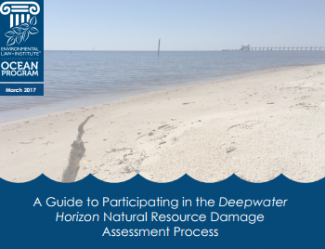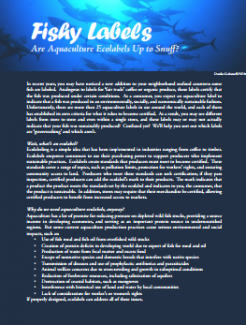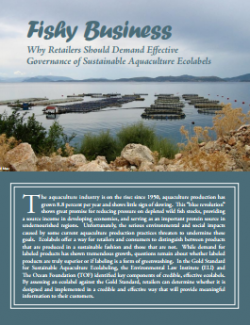Offshore Aquaculture Regulation under the Magnuson-Stevens Fishery Conservation and Management Act

A brief overview of the role of the Magnuson-Stevens Act in regulating offshore aquaculture.
Reducing Overfishing Through Traceability

A review of the potential for seafood traceability systems to reduce illegal catch and mislabeling.
A Guide to Participating in the Deepwater Horizon Natural Resource Damage Assessment Process

When an oil spill occurs, natural resources like fish, birds, and marshes may be injured. A natural resource damage assessment (NRDA) is a process focused on figuring out what those injuries are, coming up with a plan to fix those injuries, and then fixing them. This document is intended to help guide you as you determine how to engage in the Deepwater Horizon NRDA process. Following some brief background, the document is divided into two parts.
Strengthening Government-to-Government Consultation Related to Marine Subsistence Resources in Alaska

The goal of our work on Consultation is to support the role of Alaska Natives in managing trust resources, and to help ensure that consultation is an effective, efficient, and meaningful process that actually leads to sustainable—and just—management.
Sustainable Fisheries & Coastal Zoning in Barbuda: Legal & Institutional Assessment of Authorities & Approaches

The Ocean Program supports Barbuda Blue Halo Initiative, which empowers Barbudans to restore their coastal waters by developing a science-based Sustainable Coastal Policy. ELI drafted the framework report to support sustainable fisheries and coastal zoining in Barbuda.
Sustainable Fisheries & Coastal Zoning in Montserrat: Legal & Institutional Assessment of Authorities & Approaches

The first major report from Blue Halo Montserrat provides a strong legal foundation by exploring how existing legal authorities contribute to ocean management in Montserrat and how they can be used to support the Montserrat Sustainable Ocean Policy. The goal of the project is to ensure long-term health of Montserrat’s waters.
Lakes Warming Faster Than Air
Latest climate change worry: Lakes are warming faster than air, and ecosystems can’t cope.


